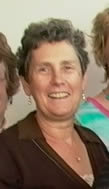Conference keynotes
A History of VALBEC: from mud-map to mainstream
Dr. Beverley Campbell
 VALBEC was established in 1978 as a professional organisation. Its journal
Fine Print began publication soon afterwards in 1979. VALBEC and Fine Print
through their presence, have provided a mirror to the adult literacy field,
reflecting trends and changes, and at the same time helping to shape those
trends through professional development activities and the many articles published.
VALBEC was established in 1978 as a professional organisation. Its journal
Fine Print began publication soon afterwards in 1979. VALBEC and Fine Print
through their presence, have provided a mirror to the adult literacy field,
reflecting trends and changes, and at the same time helping to shape those
trends through professional development activities and the many articles published.
In 2007, the VALBEC committee commissioned Bev to undertake the research and writing of a history of VALBEC using Fine Print as a primary source. Bev’s presentation gives an overview of the VALBEC History Project, through a close analysis of thirty years of Fine Print.
Two eras emerged from her research, 'The Bootstraps Era' (1979-1993), the establishment phase of the organisation of the field, when VALBEC and the field were almost synonymous, and 'Voices and Versions of the Literacy Story' (1993-to the present), when VALBEC became just one voice among many in the field. Through a VALBEC and Fine Print lens, the presentation will focus particularly on the first era to explore some of the pervasive themes shaping that time.
The publication as an outcome of the VALBEC history project will be available later this year.
Dr Beverley Campbell has been involved in education for thirty-five years, twenty-five of those in adult literacy education. In that time she held positions as community co-ordinator with Glenroy Adult Literacy Program (1984-89), co-ordinator with the CATALPA Project (1990-92), lecturer at La Trobe University (1992-96) and state coordinator of the adult literacy research network (1994-99). She is a past president of VALBEC (1988-91) and a former member of the Adult Community and Further Education Board.
In 2004 she completed doctoral studies at Monash University, with a study entitled, Acting in the middle: the dialogic struggle for professional identity in adult literacy and basic education in Victoria. She is the author of More than life itself: a handbook for tutors of adult literacy (VALBEC 1991), and is contributor to and co-editor of Fancy Footwork: adult educators thinking on their feet (VALBEC 2007). She is currently working on compiling a history of VALBEC and presented at the RAPAL conference in 2007 and will again in 2008.
… and shall forever glide: our ever-changing English language
Professor Kate Burridge, Chair of Linguistics Monash University
 To create a work of art such as a standard language is to enter into a partnership
with natural processes. Standard English can never be a finished product. As
Geoffrey Chaucer expressed it back in the 1300s, “Ye know eek, that in
forme of speeche is chaunge” (Troylus and Criseyde). Variability is the
vehicle for language evolution. What are often viewed as slipshod pronunciations,
mistakes in grammar, coinages, new-fangled meanings — these provide the
basis for real change. Some features will drop by the wayside. Some will remain
as variation. But there will be others that catch on, be used more and more
and eventually become established.
To create a work of art such as a standard language is to enter into a partnership
with natural processes. Standard English can never be a finished product. As
Geoffrey Chaucer expressed it back in the 1300s, “Ye know eek, that in
forme of speeche is chaunge” (Troylus and Criseyde). Variability is the
vehicle for language evolution. What are often viewed as slipshod pronunciations,
mistakes in grammar, coinages, new-fangled meanings — these provide the
basis for real change. Some features will drop by the wayside. Some will remain
as variation. But there will be others that catch on, be used more and more
and eventually become established.
Unfortunately, predicting change is one of the most tricky (trickiest?) tasks confronting historical linguists. We can take note of what we imagine to be the changes underway, but we can never be sure they will run their full course. Clearly, language professionals such as teachers and editors are also in a tricky position. There is never a magic time in linguistic change when misuse becomes use. It is murky and it is messy. However, there are signs that the confrontational relationship between standard and vernacular might be about to change. Many of the proscribed features of non-standard English are now extremely widespread in both native and non-native varieties of English. They are also gaining in status. With growing egalitarianism and liberalization, and with e-communication loosening the straitjacket effect of the Standard, we are seeing a more even-handed attitude to non-standard variation. Non-standard English is shaking off its stigma and ‘going public’.
Kate Burridge, BA (Hons) (UWA), PhD (London) FAHA
Kate Burridge completed her undergraduate training in Linguistics and German at the University of Western Australia. This was followed by three years postgraduate study at the University of London. Kate completed her PhD in 1983 on syntactic change in medieval Dutch. She also taught at the Polytechnic of Central London before joining the Department of Linguistics at la Trobe University in 1984. In February, she moved to Monash University to take up the Professor of Linguistics. She is a fellow of the Australian Academy of Humanities.
Her main areas of research are: grammatical change in Germanic languages; the Pennsylvania German spoken by Amish / Mennonite communities in Canada; the notion of linguistic taboo; the structure and history of English. Kate also presents weekly language segments on ABC Radio and Television.
